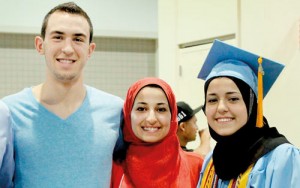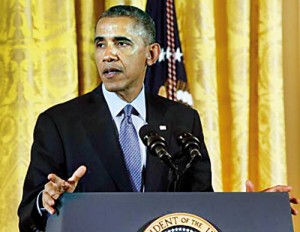Sunday Times 2
Chapel Hill shooting and western media bigotry
Three Muslim Americans were murdered on Tuesday in a University of North Carolina dorm room. The crime came on the heels of recent anti-Muslim attacks in Europe, carried out in apparent response to the January murders (committed by Muslims) of Charlie Hebdo journalists in Paris.
Western media outlets will likely frame the most recent perpetrator of what some speculate is an anti-Muslim crime in the same way they frame most anti-Muslim criminals – as crazed, misguided bigots who acted alone. If past coverage is any indication, there will likely be very little suggestion that the killer acted on the basis of an ideology or as part of any larger pattern or system.

Deah Shaddy Barakat, 23, his wife Yusor Abu-Salha, 21, and her sister Razan Abu-Salha were killed in the university town of Chapel Hill. Courtesy facebook.com/ourthreewinners
But what if acts of anti-Muslim violence are consistent with at least some strands of current western ideology? What if Islamophobia has become so commonplace, so accepted, that it now represents a hegemonic system of thought, at least for relatively large pockets of people in some regions of the West?
Portraying Islam
Given what we know both about western media portrayals of Islam and Muslims on the one hand, and media effects and theory on the other hand, it would be foolish to dismiss western media representations as potential causal factors in anti-Muslim sentiment and crime. In fact, it is likely that anti-Muslim sentiment and crime are, at least in part, driven by one-sided, narrow, sensationalistic, and arguably bigoted western media portrayals of Islam and Muslims.
Many scholars – including Edward Said, Elizabeth Poole, Kai Hafez, Milly Williamson, Karim Karim, Teun Van Dijk, Kimberly Powell, and Dina Ibrahim, among others – have carried out academic studies examining western news coverage of Islam and Muslims.
Results suggest that Muslims are often portrayed in western news media as violent, backwards, fundamentalist and as threats to western civilisation. Western news coverage rarely highlights Islam except to show its possible relation to some atrocity, and Muslims are rarely mentioned in the context of news that is positive or benign. Several studies have found that Muslims are portrayed as a homogenised body, lacking diversity and difference, with other analyses showing that news coverage of violent conflicts in the Muslim-majority world ignores context and circumstances, implying that Muslims are inherently violent and prone to conflict.
Inconsistent coverage
Other studies show inconsistent coverage of violent global and regional conflicts. When Christians, Jews and other non-Muslims are killed by Muslims, Islam is identified as playing a direct role. When Muslims are killed by Jews, Christians and other non-Muslims, however, the religious identity of the violent perpetrators is downplayed or ignored.
The ongoing conflict in Burma represents a good case-in-point. There has been little western news coverage on the recent persecution faced by Rohingya Muslims, who Human Rights Watch says have been subjected to mass killings; “crimes against humanity” and “ethnic cleansing”.
Most recently, American television news networks have underlined a possible association between groups like al-Qaeda and ISIL, on the one hand, and Islamic religious doctrine on the other. Analysts claiming that “Islam is the problem” are given prominent platforms on news talk shows, while expert Muslim voices are systematically ignored.
Notably – and in spite of the fact that each act of Muslim-perpetrated terrorism is condemned strongly by all notable Islamic universities, Islamic scholarly councils, Islamic organisations, Muslim governments, and prominent Muslim jurists – regular cries are heard from media personalities complaining that Muslims do not condemn terrorism.
Prominent media personalities
Remarkably, some prominent media personalities systematically ignore Muslim condemnations of terrorism and then scream loudly that Muslims aren’t condemning terror. Recently, both Rupert Murdoch and Piers Morgan claimed that it is primarily the responsibility of Muslims to root out and defeat the likes of al-Qaeda and ISIL.
Ignored in these analyses, of course, are the facts that Muslims in many Muslim-majority countries are often preoccupied, battling brutal dictatorships (which are often propped up by western nations, including the US), acute poverty, and regular bombing campaigns, all of which have helped create the conditions under which groups like al-Qaeda and ISIL – both of whom kill many more Muslims than non-Muslims – thrive.
In much of the western news discourse, the implication always seems clear; western societies should be suspicious of Muslims – all Muslims. Various pundits have taken to prominent media to offer up inflated estimates of the number of Muslim terrorists, with some suggesting that “peaceful” Muslims are, in the first place, a minority, and, more importantly, only peaceful because they have misunderstood the teachings of their inherently violent religion.
Always ignored is empirical evidence – of which there is no shortage – showing that Muslims aren’t more violent than non-Muslims and that the overwhelming majority of Muslims believe terrorism to be an abomination.
The discussions carried out on television news programmes are not surprising given the structural problems associated with western news, and, importantly, the basic imbalance in sourcing. Why, for example, is Hamza Hansen, a top Muslim American public intellectual, not given a regular platform on news networks alongside anti-Islam bigots who have made careers out of dissecting Islamic textual sources they do not appear to be qualified to interpret?
Media portrayals
Importantly, western entertainment media portrayals also receive unfavourable scholarly evaluations. In the most comprehensive and systematic study of Hollywood movies done to-date, media scholar Jack Shaheen examined 100 years of Hollywood film representations of Arabs and Muslims.
He found that the majority of the 900 films he examined portrayed Arabs and Muslims as “brutal, heartless, uncivilised religious fanatics and money-mad cultural ‘others’ bent on terrorising civilised westerners, especially Christians and Jews”.
No one could reasonably suggest that western news and entertainment media organisations should ignore negative portrayals of Muslims altogether. This would be unreasonable, especially given the importance of global terrorism and the involvement of Muslims in their fair share of negative events.
It is not unreasonable, however, to ask for contextualised accounts, fairer portrayals, critical examinations of the root causes of terrorism, an increase in Muslim voices, and news coverage that does more to separate ordinary Muslims from groups like al-Qaeda and ISIL.
According to the scholarly literature, the patterns of representation are fairly clear. Some fair, balanced news coverage and sympathetic entertainment media portrayals of Muslims notwithstanding, Islam and Muslims are generally portrayed negatively and stereotypically, including in some of the most powerful western media.
At what point do we begin to hold media organisations at least partly accountable for the anti-Muslim sentiment that is gripping many western nations?
Or, more importantly, when will western media organisations hold themselves to account?
(Dr Mohamad Elmasry is an assistant professor in the Department of Communications at the University of North Alabama. )
Courtesy Al Jazeera
| Obama denounces ‘outrageous murders’ of three US Muslims WINSTON-SALEM, N.C., Feb 13 (Reuters) -US President Barack Obama on Friday described the deaths of three young Muslims gunned down in North Carolina this week as “brutal and outrageous murders” and said no one in the United States should be targeted for their religion. The president’s statement came as the US Justice Department said it would join the FBI’s preliminary inquiry to determine whether the man accused in the Chapel Hill shooting on Tuesday broke any federal laws, including hate crime laws. “No one in the United States of America should ever be targeted because of who they are, what they look like, or how they worship,” Obama said in a statement, offering his condolences to the victims’ families. The families had called on Obama to insist that federal authorities investigate whether the murder suspect, 46-year-old paralegal student Craig Stephen Hicks, was motivated by hatred toward the victims because they were Muslim. Police seized more than a dozen firearms and a large amount of ammunition from his home, according to search warrants filed on Friday, WRAL-TV reported. Newlywed Deah Shaddy Barakat, 23, a University of North Carolina dental student, his wife, Yusor Mohammad Abu-Salha, 21, and her sister, Razan Mohammad Abu-Salha, 19, a student at North Carolina State University, were killed in a condominium about two miles (three km) from the UNC campus. According to the warrants, a friend of the victims’ stopped police and directed them to the condo, where authorities found Barakat dead and bleeding from his head in the front doorway, the television station reported. One of the sisters was found in the kitchen and the other in its doorway, according WRAL-TV. |


